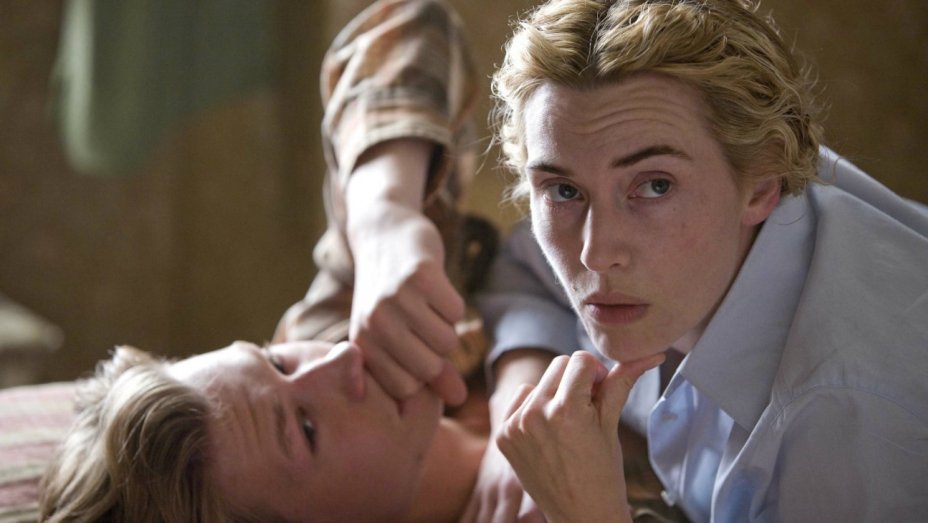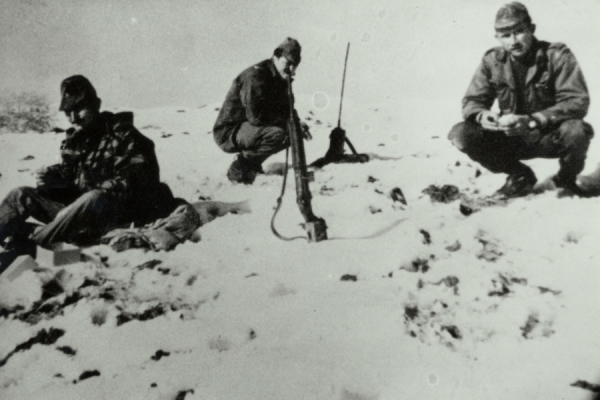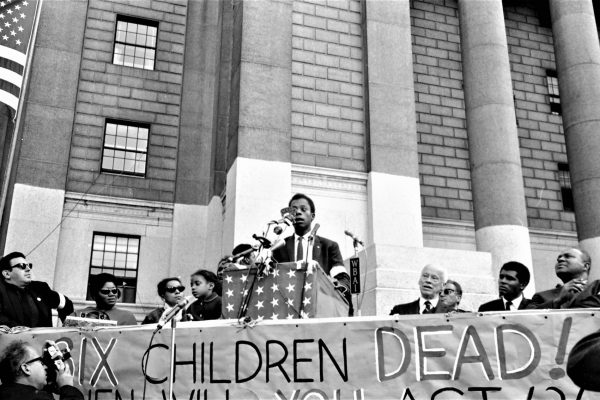Imagine, if you can, a film such as Schindler’s List in which the descendants of Nazis get to tell their side of the story. They ask the world to excuse and even to pity some of their loved ones who participated in the “final solution.”
The Reader is a such a film. Many of those who can never forget or forgive the perpetrators of the Holocaust will insist on condemning it. Many mainstream critics already have. The New York Times’s Manohla Dargis complained that it is “another movie about the Holocaust that embalms its horrors with artfully spilled tears and asks us to pity a death-camp guard” (emphasis added).
But with five Oscar nominations including best picture, the popular success of The Reader—and the critically acclaimed, widely read novel on which it is based—suggests that most of us do pity the death-camp guard. That makes it a story to ponder, a turning point in popular culture, a beginning of forgiveness if not the end of collective guilt for the Germans of the Third Reich.
The Reader stars Kate Winslet as Hanna Schmitz and Ralph Fiennes as her grown-up young lover, Michael Berg, who tells her story. Both give stunning performances. Fiennes seems to be reprising the troubled romantic we have seen before—in The English Patient, The End of the Affair, and The Constant Gardener—but Winslet’s Hanna, which earned her a best actress nomination, is an original bravura performance. Everything about the making of the film has the stamp of British theatricality at its best. David Hare, one of England’s preeminent playwrights, wrote the screenplay; Stephen Daldry, a great British stage and film director who received his third best director nomination for The Reader, pulls it off brilliantly.
But nothing one might say in a movie review runs deeper than the insights of the novel’s author, German law professor Bernhard Schlink. The best answer to critics put off by the film: read and reread the book. The charge of casuistry dissolves, and the human condition is revealed.
Schlink devised an ingenious hypothetical case in which the war criminal lacks the mens rea, the mental element necessary for a legal finding of guilt. He presents his scenario not as a bare-boned hypothetical where the exercise is obvious to the students, but in the form of a psychologically compelling bildungsroman, which takes the reader into the life of a fifteen-year-old German high school student, Michael. The adult Michael narrates the novel, looking back to 1958 when he meets Hanna, a mysterious German woman more than twice his age with whom he has his first and most passionate love affair.
Michael’s account at the beginning of the novel of the haunting, recurrent dreams about Hanna’s apartment hints that he was traumatized there. And early on there are intimations that Michael will never be able to feel as intimate with any other woman. But as the narrative unfolds, that exploitative dimension takes place in the shadows; in the foreground one seems to be watching a teenage male’s masturbation fantasy come true: an older woman who knows what she wants teaches the inept beginner to perform. Reverse the genders and the charge of sexual exploitation would be impossible to deny. But it is not just a question of gender. Even in her seduction of Michael, no one would mistake Hanna for a sexual predator.
Michael, the son of a philosophy professor, is a precocious student in an excellent school. Hanna apparently comes from German peasant stock. At age sixteen she came to Berlin to work in the Siemens factory, at twenty-one she joined the Army, and at the end of the war she held various jobs. When Michael meets her, she is working as a streetcar conductor in his hometown. He is recovering from hepatitis and vomits in the doorway of her apartment. Hanna seems to lack any bourgeois propriety about bodily functions, including sex. While other passersby avoid him in disgust, Hanna washes the vomit away, cleans him up, and sends him on home. He later returns to her apartment, with flowers from his mother to thank her. She catches him staring at her through the crack in the door as she is changing her clothes, and he bolts in shame.
His sexual attraction takes him back two weeks later, but he gives no reason this time. Hanna puts him to work carrying coal up from the basement. When he accidentally gets covered with coal dust she tells him to take his clothes off and get in the tub. There he gets an erection. She understands why Michael is there and provides him with the first of what will be an unforgettable series of sexual encounters and intimate exchanges.
For Hanna, at least as important as sex is her pleasure in having Michael read to her. And although she apparently has had little education, her taste in books mirrors the German literati; she listens intently as Michael reads all of War and Peace. She loves and understands literature and is in awe of learning.
One of the great virtues of literature is that it conveys a kind of truth about the human condition, and that truth is what Schlink gives us.
She assumes Michael is seventeen, admires his intelligence and erudition, and, on their secret visit to his home, she is amazed by his father’s library. It would be difficult to say that she intended to harm or exploit Michael. Hanna is certainly no saint, but she is pure in her heart, earthy in her body, and sensitive in her soul. The affair ends when Michael begins to be attracted to the more age- and class-appropriate girls in his high school. He worries that his refusal to recognize her in public when he is with his schoolmates sends her packing from her job, her apartment, and the city.
When Michael is a law student, we learn that a shameful secret made Hanna flee. She is illiterate. Her sense of shame about her illiteracy will be the missing thread that explains, even excuses, her war crimes. As irate readers of the novel and negative film critics complain, illiteracy is no excuse for the Holocaust. But Schlink the law professor would say, they are all “fighting the hypothetical.” He is not trying to excuse the Holocaust; he is telling the story of one woman guard at Auschwitz, a “loved” one whom Michael can forgive, even though he bears the scars of his love.
The Michael of the novel makes the affair his own shameful secret. It ruins the possibility of his finding intimacy with anyone else and so he suffers like Hanna, but he knows (as we do) that she did not intend to cause his scars and never intended to kill Jews. The moral and psychological parallels in the narrative intersect and weave together the secrets of their private and public lives. Wise to their secrets, we sense their vulnerability.
At every critical juncture in her life, Hanna chose the course that would allow her to keep her secret. She left Siemens to become an SS guard at Auschwitz to avoid a promotion that would have revealed her illiteracy. Fear of a similar offer drove her from Michael’s life. And it is to conceal her illiteracy that she invites condemnation at her trial for war crimes years later. There, when Michael has a chance to exculpate Hanna or mitigate her guilt by revealing her secret, he declines.
Is it completely arbitrary to suggest that Hanna might be understood as a symbol of the German Motherland, guilty of natural sins but not guilty of the radical evil that the Fatherland produced during the Third Reich? Indeed one might imagine this motherland, Hanna, as a victim of the Nazis, who took advantage of her simple ignorance, goose-stepped over her compliant body, and made her responsible for their crimes. A generation of Germans wants and needs to forgive its parents, and the children of that generation need to forgive their grandparents. How long must they go on rejecting the family bonds on which their own psychological identities stand? Bernhard Schlink invites them to begin by forgiving the motherland. For those who will “never forget,” The Reader is a bitter pill to swallow.
The power of The Reader, however, is that it is psychologically believable. Schlink’s book is written in short chapters; each offers at least one telling psychological insight about dreams, about memory, about the disconnect between what I do and what I am. Schlink subtly raises the vexing and intriguing problem of responsibility and agency early in the novel. Michael says:
I think, I reach a conclusion, I turn the conclusion into a decision, and then I discover that acting on the decision is something else entirely, and that doing so may proceed from the decision, but then again it may not. Often enough in my life I have done things I had not decided to do.
One of the great virtues of literature is that it conveys a kind of truth about the human condition, and that truth is what Schlink gives us.
The line between the intention and the action is deeply problematic when we think about our own lives. Explaining radically evil behavior in others, we would like to believe the connection is clearer; the evil-doers are monstrous people. Hannah Arendt refuted that claim, inventing the phrase the “banality of evil” in Eichmann in Jerusalem. Adolf Eichmann, the man directly responsible for the destruction of European Jewry, was portrayed in Israel at his trial as a monster. But Arendt could find no connection between who he was and the evil he did. Her account might suggest Michel Foucault’s general thesis that evil has gone out of our world and sickness has come into it. But it should be noted that Arendt also concluded that Eichmann was not sick. She found nothing, not even madness, to connect the person and his heinous acts.
The film is faithful to the novel and, if anything, is even more psychologically compelling.
Schlink takes a different approach. He portrays everything Hanna did as a facet of who she was. When Hanna is tried as a war criminal, everyone believes she is evil. That they also think she is a sexual predator only confirms that impression. But they are ignorant of who she really is. In the women’s labor camp where Hanna was an SS guard, she had some of the young Jewish women read to her at night. And some of the most delicate she saved from their scheduled trips to Auschwitz’s gas chambers. Those who condemn Hanna are convinced that she was sexually abusing those young women. Among those at the trial, only Michael knows the truth, and he watches without intervening as Hanna, rather than reveal her illiteracy, takes all the blame for the horrors that took place.
Those began with a forced march of Jewish women in the dead of winter out of Auschwitz in the last months of the war. Many died along the way. The surviving women are billeted one night in a church on which an allied plane drops a bomb. The church catches fire and none of the guards unlock the door, condemning the women to death in a literal holocaust. One mother and daughter survive; the girl grows up and writes a book about the fire, forcing the German government to pursue convictions in a show-trial.
The film is faithful to the novel and, if anything, is even more psychologically compelling. Winslet has always had a quality of innocent vulnerability—it was there in Titanic and in her role as the young Iris Murdoch in Iris. Her naked body, important in this film as in those earlier ones, is human and real, rather then cosmetic and pneumatic. Hanna’s straightforwardness, her veneer of hardness, betray vulnerability. The scenes of intimacy with the young German actor David Kross, who plays the teenage Michael, are explicit without being prurient or pornographic.
Hanna is a person of integrity, and, when she and the other women guards sit in the dock, it soon becomes clear that only she intends to be honest. Her candor brings down the wrath of the court and her codefendants who blame her for everything. She is the perfect scapegoat, the sexual predator and the evildoer. When asked why she did not open the door, Hanna replies: “Then the screaming began and got worse. If we had opened the doors and they had all come rushing out . . . how could we have restored order? . . . we couldn’t just let them escape!” In those words we get an explanation: she was more concerned about doing her job, more concerned about order than human lives; hers was an act of moral ignorance rather than one of malice.
Winslet’s performance convinces us that Hanna still does not know what she did wrong. And then to conceal the fact that she cannot read or write, Hanna confesses to being the leader of the guards and writing the cover-up report. Only years later, having learned to read and write in prison, does she begin to understand the enormity of the Holocaust and her role in it.
In a coda Michael goes to New York to meet the survivor of the fire to whom Hanna has left her meager savings. The woman immediately recognizes that Hanna has ruined Michael’s life and she is unwilling to accept the money or to offer forgiveness. We who are complicit in all of Michael and Hanna’s secrets hoped for more.
There are subtle differences between the novel and the film: most significantly Hare’s change in Fiennes role as Michael. In the novel, he, like Hanna, is condemned to a life of loneliness. There is no possibility of confession or redemption. He is close to no one, including his daughter, the child of a marriage that ended in divorce. In the movie Michael begins to share his secrets with his now-grown-up daughter at Hanna’s grave. We sense a healing, a redemption that Schlink never allowed us. It is the one strident note of sentimental cliché in this extraordinary film.








